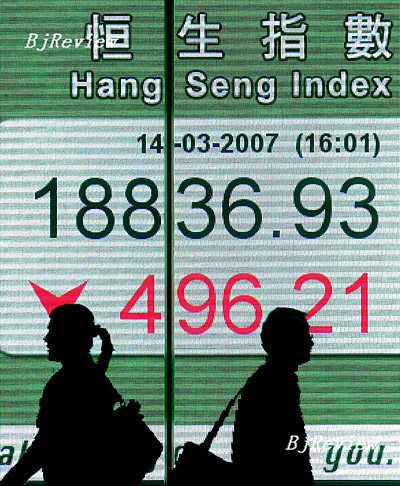
For the first time, mainland residents will be able to invest directly in overseas securities, and the Tianjin Binhai New Area will become the pilot area for the new policy, the State Administration of Foreign Exchange (SAFE) announced on August 20. If the pilot program succeeds, the policy could be extended to 40 cities across China.
According to the SAFE, investors will be able to use their foreign exchange or purchase foreign currency to open an account with the Bank of China's (BOC) Tianjin branch or with the Bank of China International Securities in Hong Kong. The new policy also scraps the rule that limits foreign exchange purchases to $50,000 annually, at least in the pilot area.
The newest policy follows other measures adopted to widen the channels for the outflow of foreign currency and to promote the balance in international payments. Qualified domestic institutional investors (QDIIs) including banks, securities companies and insurers have been allowed to invest in overseas stock markets. Before the new policy, mainland residents were forbidden to buy overseas stocks. The reasons for the restrictions were that the government believed individual investors wouldn't have the understanding needed to operate in those stock markets, and for years China had no adequate surplus of foreign currency to satisfy the demands of residents wishing to invest in overseas stocks.
However, with the rapid development of China's capital market, individuals are increasingly familiar with the operation of securities markets. The bullish domestic stock climate has also drawn more people to the allure of investing.
Moreover, China's foreign exchange reserve has increased rapidly in recent years. By the end of July this year, China had accumulated $1.4 trillion in foreign reserves, more than enough to satisfy the demands of mainland residents hoping to invest in overseas stock markets.
Wang Zhaowen, spokesman of BOC, said that the bank is ready for the new wave of investment in Hong Kong. "The first transaction may be made in September," Wang said.
All systems go
As the first and only pilot area for the new policy, the Binhai New Area has become the focus of public attention. Potential investors have been streaming in for registration and consultation.
Hu Keneng spent two hours on a plane from Shanghai to Tianjin to catch the Hong Kong stocks express. When he arrived at the BOC outlet in Tianjin, it was crowded with people going through the registration process. "I was among the first stock investors in China," said Hu. "Of course I'm going to get a taste of the Hong Kong stocks."
Although BOC's Tianjin branch hasn't received documents from supervisory departments such as the China Banking Regulatory Commission, people are quite enthusiastic about registering to climb aboard the Hong Kong stocks express. By September 7, there were already 4,000 investors going through registration formalities.
"The fundamental cause for the mass enthusiasm over investment in Hong Kong stocks is that the prices of H shares issued in Hong Kong are much lower than those of A shares," said Wang Jian, an analyst from S&E Securities.
At present, nearly 50 companies have issued stocks in both the Hong Kong stock market (H shares) and the mainland stock market (A shares). According to the closing price on September 7, Luoyang Glass Co. Ltd. had the largest price gap. Its price for A shares was 8.08 yuan, while the price for H shares was only HK$0.87, one 10th that of the A shares. The A shares prices of CITIC Bank, China Southern Airlines and Sinopec were about twice those of H shares.
"There are such huge price gaps between the same stocks of the same company with the same rights," Wang said. "Hong Kong stocks, with lower prices, are inevitably more attractive to mainland investors."
| 